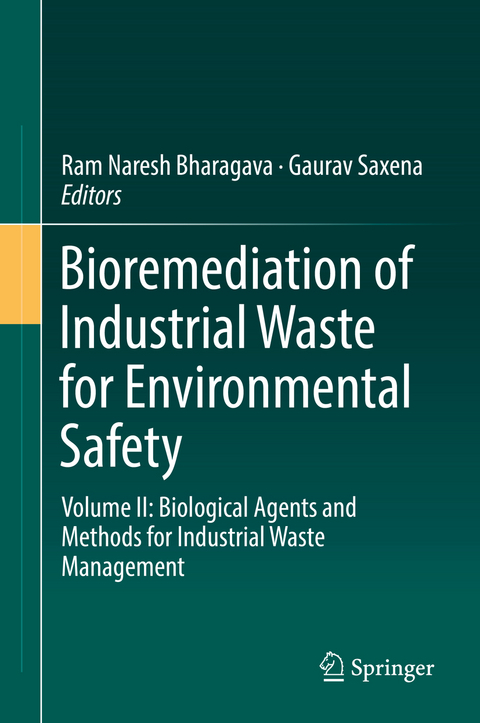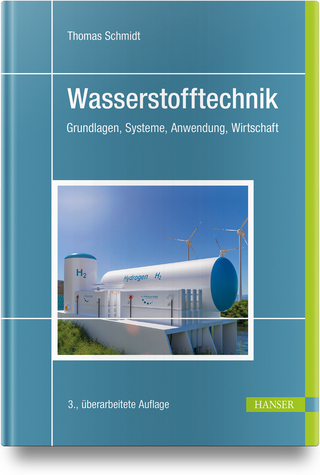
Bioremediation of Industrial Waste for Environmental Safety
Springer Verlag, Singapore
978-981-13-3425-2 (ISBN)
This book (Volume II) describes the role of biological agents in the degradation and detoxification of organic and inorganic pollutants inindustrial wastes, and presents recent bioremediation approaches for waste treatment and management, such as constructed wetlands, electro- bioremediation and nano-bioremediation, as well as microbial fuel cells. It appeals to students, researchers, scientists, industry professionals and experts in the field of microbiology, biotechnology, environmental sciences, eco-toxicology, environmental remediation and waste management and other relevant areas who are interested in biodegradation and bioremediation of industrial wastes for environmental safety.
Dr. Ram Naresh Bharagava was born in 1977 and completed school education from Government Schools at Lakhimpur Kheri, Uttar Pradesh (UP), India. He received his B.Sc. degree (1998) in Zoology, Botany, and Chemistry from the University of Lucknow, Lucknow, UP, India, and M.Sc. degree (2004) in Molecular Biology and Biotechnology from Govind Ballabh Pant University of Agriculture & Technology (GBPUAT), Pantnagar, Uttarakhand (UK), India. He received his Ph.D. degree (2010) in the area of Microbiology jointly from the Environmental Microbiology Division, Council of Scientific and Industrial Research (CSIR)-Indian Institute of Toxicology Research (IITR), Lucknow, and Pt. Ravishankar Shukla University, Raipur, Chhattisgarh, India. He was a Junior Research Fellow (JRF) during his Ph.D., qualified twice (2002 & 2003) in the CSIR-National Eligibility Test (NET) and once in the Graduate Aptitude Test in Engineering (GATE) in 2003. His major research work during his Ph.D. degreefocused on the bacterial degradation of recalcitrant melanoidin from distillery wastewater. He has authored one book entitled Bacterial Metabolism of Melanoidins from Distillery Effluent and edited five books entitled Bioremediation of Industrial Pollutants, Environmental Pollutants and Their Bioremediation Approaches, Emerging and Ecofriendly Approaches for Waste Management, and Recent Trends in Environmental Management and Bioremediation of Industrial Waste for Environmental Safety: Industrial Waste and Its Management (Volume I). He has published more than 117 research items including research/review papers/two book reviews in national and international journals of high impact factor published by Springer Nature, Elsevier, and Taylor & Francis Group. He has also written more than 40 book chapters for national and international edited books. He has published many scientific articles in national and international science magazines. He has presented many papers relevant tohis research areas in national and international conferences. He has served as a potential reviewer for various national and international journals in his respective areas of research. He has also been awarded a postdoctoral appointment at CSIR-IITR, Lucknow, but left the position after a while and subsequently joined (2011) Babasaheb Bhimrao Ambedkar (Central) University, Lucknow, UP, India, where he is currently Assistant Professor of Environmental Microbiology, and actively engaged in teaching at postgraduate and doctoral levels and research on various Government of India (GOI) sponsored research projects in the area of environmental toxicology and bioremediation at the Laboratory for Bioremediation and Metagenomics Research (LBMR), Department of Environmental Microbiology (DEM). His research has been financially supported by the University Grants Commission (UGC) and Department of Science and Technology (DST) India. He has been the advisor of 60 postgraduate and five doctoral students and currently the mentor of one project fellow and one doctoral student. His major thrust areas of research are the biodegradation and bioremediation of environmental pollutants in industrial wastewaters, metagenomics, and wastewater microbiology. He is life member of the Academy of Environmental Biology (AEB), Association of Microbiologists of India (AMI), and Biotech Research Society (BRSI), Indian Science Congress Association (ISCA), India. He can be reached at bharagavarnbbau11@gmail.com. Gaurav Saxena was born in 1989 and completed school education from Government Schools at Shahjahanpur, Uttar Pradesh (UP), India. He received his B.Sc. degree (2010) in Industrial Microbiology, Zoology, Botany, and Chemistry from Hemwati Nandan Bahuguna Garhwal (Central) University (HNBGU), Srinagar (Garhwal), Uttarakhand (UK), India, and then moved to Babasaheb Bhimrao Ambedkar (Central) University, Lucknow, UP, India, where he received his M.Sc. degree (2013) in Environmental Microbiology. Because of his interest in environmental safety and sustainability, Mr. Saxena joined Babasaheb Bhimrao Ambedkar (Central) University, Lucknow, UP, India, to further pursue doctoral research in environmental microbiology at the Laboratory for Bioremediation and Metagenomics Research (LBMR), Department of Microbiology (DM). Currently, he is a senior doctoral student and investigating the role of microbes in biodegradation/bioremediation of industrial effluents containing highly toxic organic and inorganic pollutants and their ecotoxicological assessment and engaged in developing eco-friendly treatment solutions for hazardous tannery effluent. His research work was financially supported by the University Grants Commission (UGC) and the Department of Science and Technology (DST), Government of India (GOI), New Delhi, India. He has qualified (2015) in the National Eligibility Test (NET) and also received the Junior Research Fellowship (JRF) of DST, GOI, New Delhi, India. He has been awarded honorary “Young Environmentalist Award-2018” by Agro-Environmental Development Society (AEDS), India, in recognition of his scientific work. He is the editor of two books, entitled Bioremediation of Industrial Pollutants and Bioremediation of Industrial Waste for Environmental Safety: Industrial Waste and Its Management (Volume I). He is also on the editorial board of Frontiers in Microbiology journal and serving as a review editor. He has published many scientific papers and one book review relevant to his field in high impact national and international journals published by Springer Nature, Elsevier, and International Water Association (IWA). He has also written several chapters on the relevant topics of his field for national and international edited books published by Springer Nature, Taylor & Francis, and Elsevier. He has published many scientific articles in national and international science magazines and also presented his research works in national and international conferences. He is also serving as a potential reviewer for various scientific national and international journals in his research areas. He has received several short-term trainings on various subjects like bioremediation, various analytical techniques for pollutant detection and characterization in environmental samples, molecular techniques, biological treatment of waste, nanotechnology, and research methodology from national laboratories, institutes, and universities in India. He is always interested in collaborating with national and international researchers relevant to his research area, and his major thrust areas of research are environmental microbiology, biotechnology, and toxicology, bioremediation/phytoremediation of environmental pollutants/industrial effluents, metagenomics, wastewater microbiology, and wastewater treatment. He is a life member of the Association of Microbiologists of India (AMI), Indian Science Congress Association (ISCA), and Agro-Environmental Development Society (AEDS), India. He is a nature lover and has keen interest in environmental protection. He can be reached at gaurav10saxena@gmail.com. For more updates on his research, please visit ResearchGate profile (www.researchgate.net/profile/Gaurav_Saxena2).
- Genetically Modified Organisms (GMOs) and Their Potential in Environmental Management: Constraints, Prospects and Challenges.- Advances in Bioremediation of Toxic Heavy Metals and Radionuclides in Contaminated Soil and Aquatic Systems. - Phycoremediation: Algae as Eco-Friendly Tools for the Removal of Heavy Metals from Wastewaters.- Phytoremediation: An Emerging Green Technology for Environmental Decontamination, Prospects for Future Research and Challenges.- Emerging and Ecofriendly Technologies for Removal of Organic and Inorganic Pollutants from Industrial Wastewaters.- Constructed Wetlands: A Clean-Green Technology for Degradation and Detoxification of Industrial Wastewaters.- Nano-Bioremediation: An Innovative Remediation Technology for Treatment and Management of Contaminated Sites.- Electro-Bioremediation: An Advanced Remediation Technology for Treatment and Management of Contaminated Soil.- Microbial Fuel Cell (MFC): An InnovativeTechnology for Wastewater Treatment and Power Generation.- Functional Diversity of Plant Endophytes and their Role in Assisted Phytoremediation.- Toxic Metals in Industrial Wastewaters and Phytoremediation Using Aquatic Macrophytes for Environmental Pollution Control: An Eco-Remedial Approach.- Microalgae: An Ecofriendly Tools for the Treatment of Wastewaters for Environmental Safety.- Phycoremediation: An Integrated and Eco-Friendly Approach for Wastewater Treatment and Value-Added Product Potential.- Pulp Paper Mill Wastewater: Eco-Toxicological Effects and Bioremediation Approaches for Environmental Safety. - Cadmium as Environmental Pollutant: Eco-Toxicological Effects, Health Hazards and Bioremediation Approaches for Its Detoxification from Contaminated Sites. - Cyanobacteria: The Eco-friendly Tools for the Treatment of Industrial Wastewaters. - Plant-Microbe Interactions for Bioremediation and Phytoremediation of Environmental Pollutants and Agro-Ecosystem Development.- Molecular Technologies for Assessment of Bioremediation and Characterization of Microbial Communities at Contaminated Sites. - Biochar: A Sustainable Tool in Soil Pollutants Bioremediation.- Bioremediation of Melanoidins Containing Distillery Waste for Environmental Safety.- Progresses in Bioremediation Technologies for Industrial Waste Treatment and Management: Challenges and Future Prospects.
| Erscheinungsdatum | 22.05.2019 |
|---|---|
| Zusatzinfo | 62 Illustrations, color; 8 Illustrations, black and white; XXVIII, 538 p. 70 illus., 62 illus. in color. |
| Verlagsort | Singapore |
| Sprache | englisch |
| Maße | 155 x 235 mm |
| Themenwelt | Naturwissenschaften ► Biologie ► Ökologie / Naturschutz |
| Naturwissenschaften ► Geowissenschaften | |
| Technik ► Umwelttechnik / Biotechnologie | |
| ISBN-10 | 981-13-3425-0 / 9811334250 |
| ISBN-13 | 978-981-13-3425-2 / 9789811334252 |
| Zustand | Neuware |
| Informationen gemäß Produktsicherheitsverordnung (GPSR) | |
| Haben Sie eine Frage zum Produkt? |
aus dem Bereich


